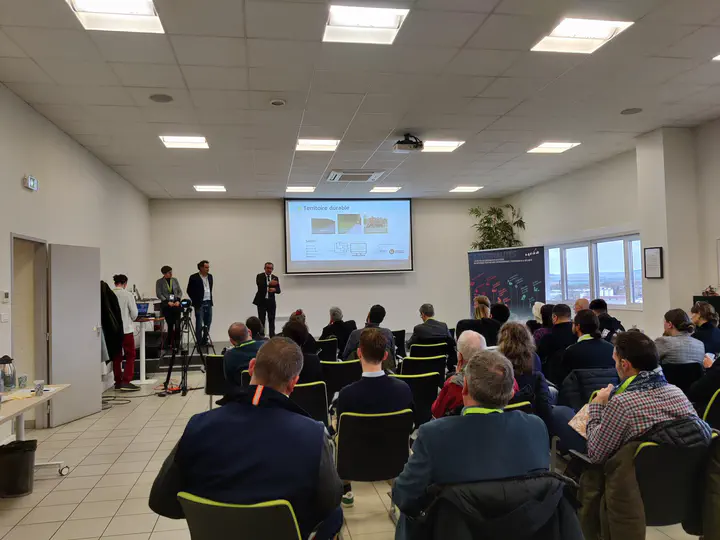Summary of the launch seminar
The multi-partner chair SAGID+ was inaugurated on Thursday, November 9th, at the headquarters of the ACTIBAC group (NOREMAT, ACCOPILOT, MANEKO) in Ludres, in the presence of Hélène Boulanger, President of the University of Lorraine, Christophe Choserot, Vice President delegated to Higher Education Research Innovation of the Metropolis of Grand Nancy, and Christophe Bachmann, President of the ACTIBAC group.

The multi-partner chair “SAGID+” aims to develop tools and methods for integral and sustainable management of green dependencies involving all stakeholders in the territory. Specifically, the overall objective of the chair is to develop “turnkey” tools and methods capable of assessing the sustainability of practices implemented during the decision-making process, with the subsequent contribution to (1) integrating the profession of roadside maintenance into the bioeconomy sectors and (2) evolving eco-responsible behaviors. The SAGID+ chair benefits from the scientific expertise of the ERPI Research Unit (Research Team on Innovative Processes) at the University of Lorraine, the SILVA Joint Research Unit, under joint supervision by the University of Lorraine, AgroParisTech, INRAE, the LORIA Joint Research Unit (Lorraine Laboratory of Computer Science and its Applications) under joint supervision by the University of Lorraine, CNRS, INRIA, and ENSGSI. It also benefits from the industrial expertise of the ACTIBAC group, specialized in the management of green dependencies through the companies NOREMAT and ACCOPILOT.
This chair is the winner of the “Support for Industrial Chairs 2022” call for projects from the Grand Est region. It is co-financed by the European Union with the European Regional Development Fund to the tune of €409,500, by the ACTIBAC group and the Metropolis of Grand Nancy for a subsidized cost of €1,094,822 (total project cost around €2 million). The project contributes to the collective ambition “Des Hommes et Des Arbres, les racines de demain” (Men and Trees, the roots of tomorrow), labeled as a Territory of Innovation, and has also obtained the “Solar Impulse Efficient Solution Label.”
Supported by the association “Des Hommes et Des Arbres,” the Carnot ICEEL institute, and the EMPP Cluster, the inaugural seminar provided an opportunity to engage with the community of partners and stakeholders through a program of conferences and workshops with participants.
“Road Dependencies and Hydro-Sedimentary Transfers” by Romain Reulier—Associate Professor in Geography at the University of Caen Normandy—IDEES Laboratory. “Towards a more sustainable management of roadside areas—Experiences from the Côtes-d’Armor department” by Frédérique Morin—Responsible for Sustainable Management of Green and Blue Dependencies at the Côtes D’Armor Departmental Council. “Tree-lined Alleys—Avenues of the Future” by Chantal Pradines—General Delegate of the Allées-Avenues Association, a specialist in avenues in France and Europe. Following these presentations, participants divided into three workshops:
“Towards Shared Decision-Making: Experimentation of a Tool for the Collective Construction of Roadside Management Scenarios” facilitated by Manon Enjolras and Mauricio Camargo. Participants experimented with the ConsensUs tool, an online platform for multi-stakeholder decision support. The ambition was to simulate a collective and shared decision-making process regarding the implementation of a new roadside management scenario within a municipality. The participants, representing biodiversity experts, economic stakeholders, and infrastructure managers, shared their perspectives and discussed the challenges of transitioning from traditional roadside maintenance to reasoned maintenance. ConsensUs supported these discussions by highlighting the positions and visions of each stakeholder, identifying mutual agreements and critical divergences for further discussions.
“First Steps towards a Decision Support Tool for Roadside Management” facilitated by Brice Corrigeux. The workshop aimed to test and discuss improvements to the computer model of the SAGID tool. Participants individually used the tool following a user guide, providing valuable feedback. Various improvement suggestions were raised, such as easier access to different information, breaking down the configuration into distinct steps, organizing the dashboard to limit on-screen information, retaining initial maintenance parameters in memory, enabling faster comparison of preconfigured maintenance plans, and creating multiple usage modes: discovery, awareness, communication, estimation. The workshop concluded with a collective discussion about the tool, as there was insufficient time for the initially planned co-design step, which also led to connections with other projects like the BourSE des services écosystémiques led by the Des Hommes et Des Arbres association or the work of the Soil and Environment Laboratory.
“Prospective: Reflections on Levers and Barriers for Future Biomass Valorization Sectors from Roadside Areas” facilitated by Vincent Boly and Fedoua Kasmi. This workshop aimed to discuss variables that could favor or limit the emergence of biomass valorization sectors from roadside areas. The participants evaluated seven variables based on previous research and discussions, assessing whether these variables acted as levers or barriers for biomass valorization sectors and their impacts. The variables included biomass availability and variability, the selling price of roadside biomass, human and financial resources of municipalities, the evolution and maturity of conversion technologies, labor in the sector, changes in public policies, laws, and government actions, and the dynamics of the biomass market. The results indicated that biomass availability and variability, selling price, municipal resources, and technological evolution were identified as levers, emphasizing their importance in the viability of the sector. The workshop concluded with participants proposing action plans to address these variables in the context of biomass valorization from roadside areas.
The seminar provided a valuable opportunity for knowledge exchange and collaboration, and the participants look forward to continued interactions throughout the research project.